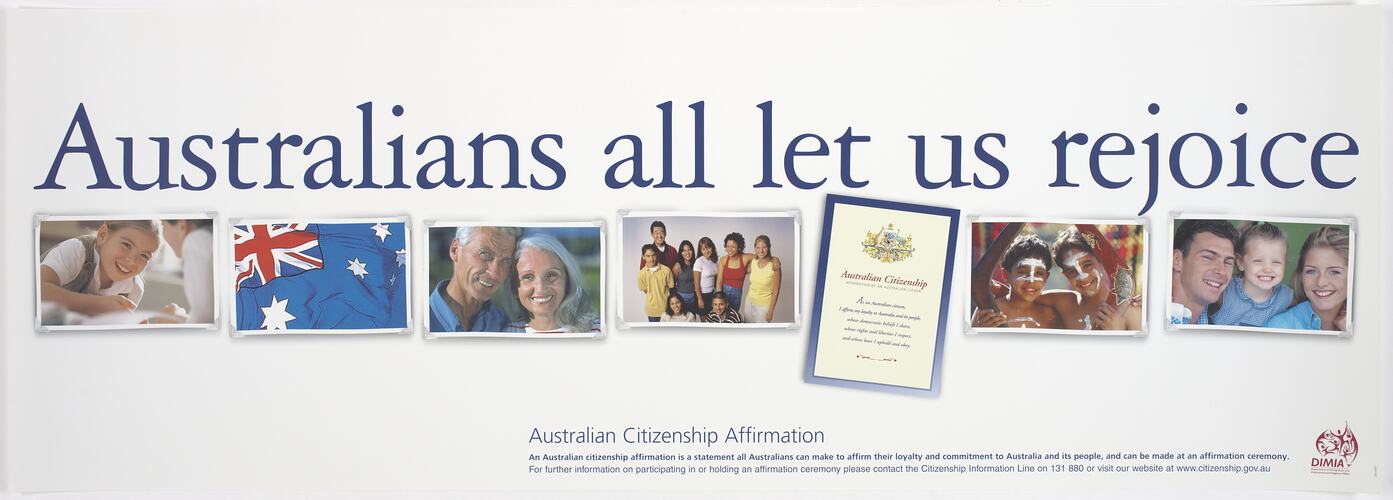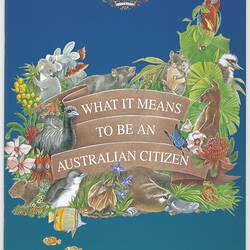Summary
Poster issued by the Department of immigration, Multicultural and Indigenous Affairs in 2004 to encourage 'Australian Citizenship Affirmation'.
Poster features 5 photographs of people of different ages and ethnic backgrounds, as well as an Australian flag and the Australian citizenship oath, on a white background.
Physical Description
Elongated rectangular poster, thick gloss paper. It features 5 photographs of people of different ages and ethnic backgrounds, as well as an Australian flag and the Australian citizenship oath, on a white background. It states: "Australian Citizenship Affirmation: An Australian citizenship affirmation is a statement all Australians can make to affirm their loyalty and commitment to Australia and its people, and can be made at an affirmation ceremony."
Significance
Issued by the Department of Immigration, Multicultural and Indigenous Affairs in 2004. Some of the documents are part of the 'Living in Harmony' initiative; others are part of a strategy to encourage immigrants to become Australian citizens. The documents add to a developing collection of material relating to Australian citizenship and political notions of social cohesion and cultural identity.
The focus of the Living in Harmony initiative is Harmony Day, held each year on 21 March since 1999. The day promotes the notion of Australia as a multicultural society, provides an opportunity for commitment to respect and understanding between Australians of all backgrounds and encourages the rejection of racism. The Living in Harmony initiative also provides a community grants program and a community partnership program - refer http://www.immi.gov.au/multicultural/harmony/index.htm. The grants are targeted at interfaith, youth, media and arts and sport. In 2004, priority target areas are innovative projects aimed at the genuine and important needs of older Australians, Australians living in rural and regional areas, Australian women, with particular emphasis on Muslim women and Indigenous Australians. The Living in Harmony documents contribute to the record of the post-war political shift from the idea of assimilation to that of multiculturalism.
The citizenship documents provide contemporary information about a process of naturalization that was in effect in the Colonies as early as the 1850s. After World War II annual citizenship conventions discussed issues surrounding citizenship and population in the context of mass migration programs. The debate continues today. The proposed documents represent on-going attempt to encourage migrants to take out citizenship as well as a new trend towards affirmation - existing citizens reaffirming their national allegiances. This may be interpreted within a current environment of national security fears and a desire to engender a politcally inspired national unity. Like the community movements of the 1950s (such as the Good Neighbour movement), there is also a desire to encourage participation and initiatives at a community level with the calls for community citizenship and affirmation events.
More Information
-
Collecting Areas
-
Acquisition Information
Collected from Department of Multicultural and Indigenous Affairs, Ms Deborah Tout-Smith - Museum Victoria, 20 Apr 2004
-
Publisher
Department of Immigration and Multicultural and Indigenous Affairs (DIMIA), Australia, 2004
-
Inscriptions
Australians All Let Us Rejoice / Australian Citizenship Affirmation
-
Classification
Migration, Naturalisation & citizenship, Promotional materials
-
Category
-
Discipline
-
Type of item
-
Object Measurements
83.9 cm (Length), 29.7 cm (Width)
including toggle
-
Keywords
Citizenship, Government Departments, Government Policies, Immigration

